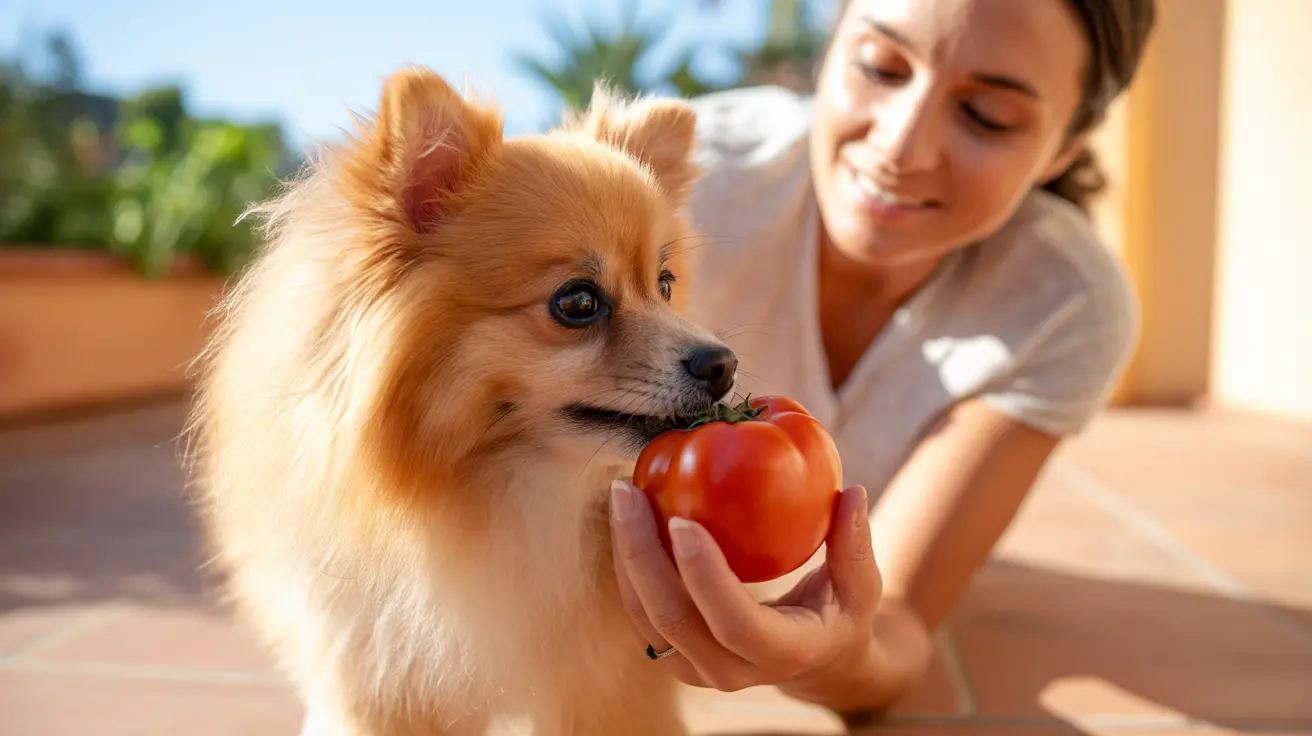As a pet owner, you might wonder if sharing tomatoes with your furry friend is safe. While dogs can indeed have tomatoes, there are important guidelines and precautions to follow. This comprehensive guide will help you understand when and how to safely incorporate tomatoes into your dog's diet, along with potential risks to watch out for.
Understanding the dos and don'ts of feeding tomatoes to dogs can help prevent accidental poisoning while allowing your pet to enjoy the nutritional benefits of this popular fruit. Let's explore everything you need to know about dogs and tomatoes.
The Safety of Ripe vs. Unripe Tomatoes
Ripe, red tomatoes are generally safe for dogs when fed in moderation. These mature tomatoes contain minimal amounts of potentially harmful compounds and can be a healthy addition to your dog's diet when properly prepared.
However, green unripe tomatoes and tomato plant parts (stems, leaves, and vines) contain higher concentrations of solanine and tomatine, which are toxic to dogs. These substances can cause serious health issues, particularly in smaller dogs and puppies.
Nutritional Benefits for Your Dog
When fed appropriately, ripe tomatoes offer several nutritional advantages for dogs:
- Low in calories and high in fiber
- Rich in vitamin C for immune system support
- Contains potassium for heart and muscle health
- Packed with lycopene, a powerful antioxidant
- Good source of beta-carotene and vitamin A
Safe Feeding Guidelines
Follow these essential rules when offering tomatoes to your dog:
- Remove all stems, leaves, and green parts
- Wash thoroughly to remove pesticides
- Cut into small, manageable pieces
- Start with tiny amounts to test tolerance
- Limit treats to 10% of daily caloric intake
Signs of Tomato Toxicity to Watch For
While rare, tomato poisoning can occur if your dog consumes green tomatoes or plant parts. Watch for these symptoms:
- Gastrointestinal upset (vomiting, diarrhea)
- Lethargy and weakness
- Confusion or disorientation
- Abnormal heart rate
- Dilated pupils
- Tremors or seizures
Types of Tomatoes to Avoid
Not all tomato products are safe for dogs. Avoid giving your pet:
- Tomato sauce or pasta sauce
- Ketchup or condiments
- Canned tomatoes with additives
- Sun-dried tomatoes with preservatives
- Any tomato products with garlic or onions
Frequently Asked Questions
Can dogs safely eat ripe tomatoes, and how much is appropriate?
Yes, dogs can safely eat ripe tomatoes in moderation. A few small pieces of ripe, red tomato once or twice a week is generally safe for most dogs. Always remove any green parts and start with tiny amounts to monitor for adverse reactions.
Why are green tomatoes and tomato plant parts toxic to dogs?
Green tomatoes and plant parts contain higher levels of solanine and tomatine, natural compounds that are toxic to dogs. These substances can cause gastrointestinal upset, nervous system problems, and other serious health issues.
What signs indicate tomato poisoning in dogs and when should I contact a vet?
Signs of tomato poisoning include vomiting, diarrhea, lethargy, confusion, muscle weakness, and abnormal heart rate. Contact your veterinarian immediately if you notice any of these symptoms after your dog consumes tomatoes or tomato plants.
Are cooked or cherry tomatoes safe for dogs, and how should they be prepared?
Plain cooked and cherry tomatoes are safe when ripe and properly prepared. Remove all stems and leaves, wash thoroughly, and cut into small pieces to prevent choking. Avoid seasoned or processed tomato products.
What precautions should I take before feeding tomatoes to my dog for the first time?
Start with a tiny amount of ripe tomato and monitor your dog for any adverse reactions. Consult your veterinarian first, especially if your dog has existing health conditions. Always remove green parts and ensure the tomato is fully ripe.
Conclusion
While dogs can safely enjoy ripe tomatoes in moderation, it's crucial to follow proper preparation guidelines and watch for any adverse reactions. Remember to keep tomato plants and green tomatoes away from your pet, and always consult your veterinarian before introducing new foods to your dog's diet.
By following these guidelines, you can safely share the nutritional benefits of tomatoes with your canine companion while avoiding potential risks. When in doubt, err on the side of caution and stick to your dog's regular diet and vet-approved treats.






